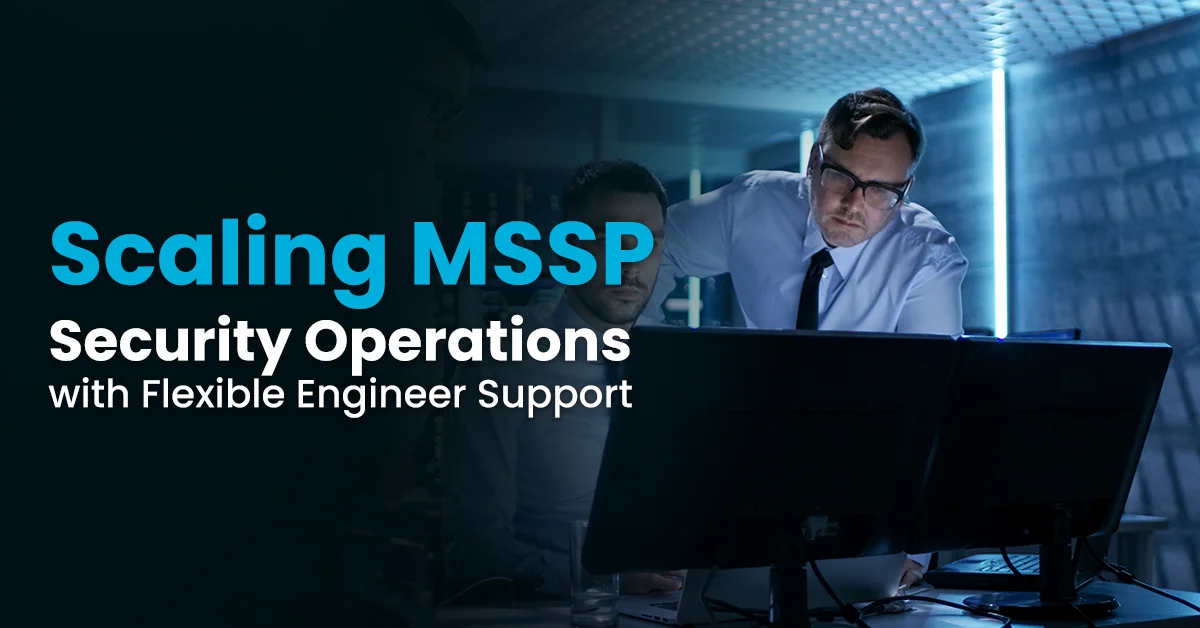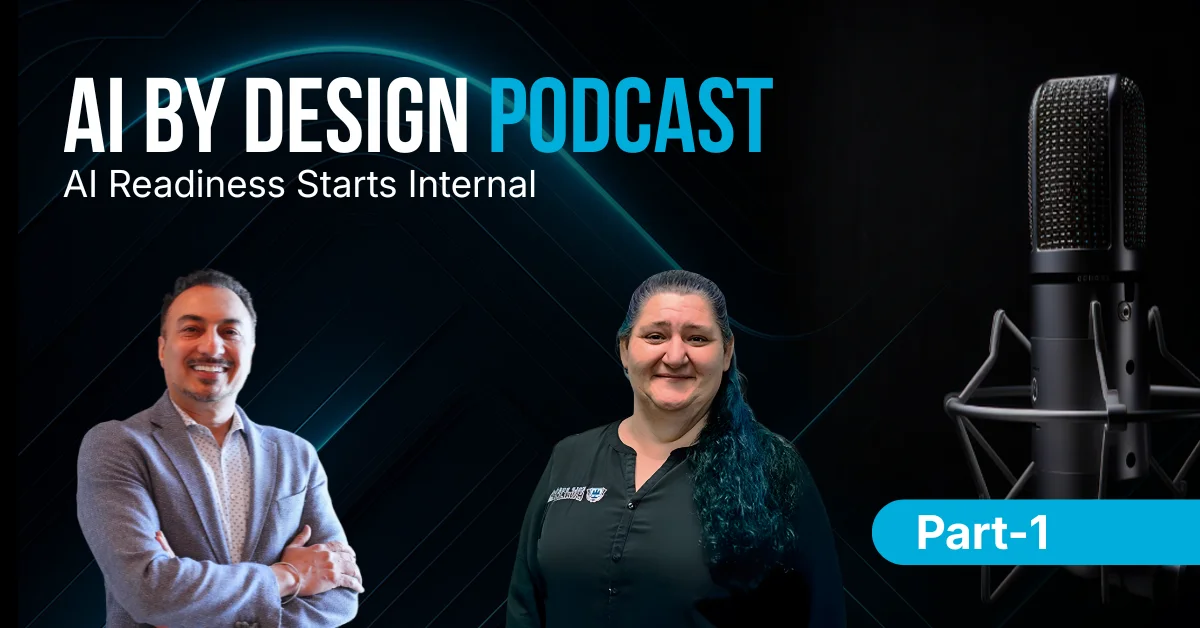MSSP security operations are hitting a critical scaling problem. The market’s projected to reach $69.16 billion by 2030 according to Mordor Intelligence, but most providers can’t grow fast enough to meet demand.
The bottleneck? You need 24/7 security operations center support, specialized expertise across multiple domains, and consistent service quality; but hiring full-time engineer for every need isn’t financially viable. Traditional staffing models don’t work when client demands fluctuate and cyber threats don’t follow a 9-to-5 schedule.
Flexible engineer support solves this. Here’s how MSSP security operations can scale without breaking the bank or burning out your team.
What MSSP Security Operations Actually Mean
Understanding the foundation helps clarify why scaling is so challenging in the first place.
MSSP security operations aren’t just about watching monitors and sending alerts. You’re running a full security operations center that monitors threats, investigates incidents, and responds before damage happens. Your clients expect enterprise-level protection without enterprise-level budgets.
The problem? Delivering consistent MSSP security operations across dozens or hundreds of clients while juggling different tech stacks, compliance requirements, and threat landscapes. And doing all this while your competitors are breathing down your neck.
Why MSSP Scalability Matters More Than Ever
The security landscape has fundamentally changed, and your operational model needs to change with it.
The Demand for Security Operations Center Support is Exploding
Cyber threats aren’t slowing down. Neither are client expectations. Your clients need enterprise-level security without enterprise budgets, and they’re looking to you to deliver it.
Your clients want:
- 24/7/365 threat monitoring (not just business hours coverage)
- Sub-15-minute response times for critical incidents
- Compliance reporting that doesn’t require a PhD to understand
- Proactive threat hunting, not just reactive alert chasing
The kicker? They want all this at a price point that makes CFOs smile.
Traditional MSSP Challenges That Kill Growth
Here’s what’s blocking your MSSP scalability:
- The talent crisis is real: The cybersecurity industry faces a persistent talent shortage, making it nearly impossible to compete with tech giants offering six-figure salaries and unlimited PTO.
- Turnover rates are brutal: You finally hire someone decent, train them for three months, and they leave for a $20K raise elsewhere. The cycle repeats.
- Fixed costs are crushing margins: You need full-time staff for peak incident periods, but they’re idle 60% of the time during normal operations.
This is where flexible engineer support changes the game for MSSP security operations.
Real Problems Facing MSSP Security Operations Right Now
These aren’t hypothetical scenarios; they’re issues MSSPs face daily that directly impact revenue and client retention.
The 24/7 Coverage Nightmare
Picture this: You land a major healthcare client requiring round-the-clock SOC service for MSP. Great news, right? Except you need to staff nights, weekends, and holidays without burning out your existing team.
What happens instead:
- Night shift gets three alerts. Two are false positives, but the third is a ransomware attempt that goes unnoticed for 6 hours
- Your analyst is handling alerts for five different clients simultaneously
- By Monday morning, you’re explaining to the CISO why their data is being held for ransom
The real solution: Layer on-demand security operations center support during off-peak hours. You maintain quality coverage without tripling your payroll. Your core team handles complex escalations while flexible engineers manage tier-1 monitoring and initial triage.
Alert Fatigue is Drowning Your Analysts
Your SIEM generates thousands of alerts daily. Most security teams struggle with significant skills gaps, which means your analysts are overwhelmed and critical threats slip through the cracks.
The reality check:
- 95% of alerts are false positives
- Your analysts spend more time dismissing noise than hunting threats
- When a legitimate breach happens, it’s buried under 2,000 “critical” alerts about someone forgetting their password
What actually works: Bring in experienced engineers specifically for SIEM tuning and alert optimization. These specialists reduce false positives by 60-70% in the first month, letting your team focus on real threats. This type of NOC support for MSSPs transforms operational efficiency overnight.
The Specialist Skills Gap
A client gets hit with a sophisticated cloud attack targeting their AWS environment. Your generalist SOC analysts are great with traditional network security, but they’re out of their depth with cloud-native threats.
The impact:
Incident resolution drags from 4 hours to 3 days
The client loses confidence in your MSSP security operations
You lose the renewal because they found an MSSP with cloud expertise
The fix: Access specialized engineers on-demand. Cloud security experts for AWS/Azure incidents. OT specialists for industrial clients. Forensics experts for advanced persistent threats. You don’t need full-time specialists in every domain; you need them exactly when clients need them.
How Flexible Engineer Support Enables MSSP Scalability
The solution isn’t working harder—it’s working smarter with the right support structure. Flexible engineer support transforms MSSP security operations by providing scalable resources exactly when and where you need them.
On-Demand Models That Make Financial Sense
Forget the old choice between hiring full-time or staying understaffed. Modern SOC support for MSSPs offers multiple engagement options:
Staff augmentation: Add engineers for specific shifts or projects. Pay for 20 hours weekly instead of a full-time salary with benefits.
Overflow support: Your team handles normal operations; flexible engineers kick in during incident spikes or vacation coverage.
Fully managed tiers: Offload tier-1 and tier-2 operations entirely while your team focuses on tier-3 escalations and client relationships.
Here’s the math: A full-time security analyst costs significantly more than strategic use of flexible engineers at hourly rates—cutting costs by 40-60% while improving coverage quality.
Hybrid SOC and NOC Support Models
The best MSSP security operations combine internal expertise with external flexibility. Your core team maintains client relationships and handles complex investigations. Flexible engineers provide consistent monitoring, initial response, and specialized expertise.
This hybrid approach delivers:
- Seamless 24/7 coverage without exhausting your team
- Consistent service quality across all shifts
- Rapid scaling when you land new clients
- Knowledge transfer that builds internal capabilities over time
Integration takes 1-2 weeks, not months. Experienced NOC support for MSSPs engineers work with your existing tools—Splunk, Microsoft Sentinel, CrowdStrike, whatever you’re running.
Technology That Multiplies Effectiveness
Smart MSSP scalability isn’t just about adding people. It’s about leveraging technology that makes every engineer more effective:
- SOAR platforms automate 60% of repetitive tasks
- Unified dashboards give external engineers instant client environment visibility
- Standardized playbooks ensure consistent response quality
- AI-assisted triage surfaces genuine threats from alert noise
When you combine skilled flexible engineers with properly tuned technology, your MSSP security operations can handle 3-5x more clients without proportional cost increases.
Essential Components of Effective SOC Support for MSSPs
Knowing what to look for in security operations center support saves time and prevents costly mistakes.
Skills and Certifications That Matter
Not all security engineers are created equal. For reliable security operations center support, look for:
Core certifications: CISSP, GCIA, CEH, Security+, or equivalent practical experience
Experience levels:
- Tier 1: 1-2 years, handle initial triage and basic investigations
- Tier 2: 3-5 years, conduct detailed analysis and remediation
- Tier 3: 5+ years, handle complex incidents and threat hunting
Specialized knowledge: Cloud security (AWS, Azure, GCP), industrial control systems, threat intelligence, digital forensics
The key is matching engineer expertise to your specific MSSP security operations needs.
SLAs and Metrics That Actually Mean Something
Define clear expectations for your security operations center support:
Response times:
- Critical incidents: 15-minute initial response
- High priority: 1-hour response
- Medium priority: 4-hour response
Performance metrics:
- Mean Time to Detect (MTTD): How fast threats are identified
- Mean Time to Respond (MTTR): How quickly incidents are contained
- False positive reduction: Measuring alert quality improvements
- Client satisfaction scores: The ultimate metric
Track these religiously. What gets measured gets managed, and SOC support for MSSPs lives or dies on consistent execution.
Implementing Flexible Engineer Support in Your MSSP
Successful implementation requires a structured approach, not a rushed rollout.
Start with honest assessment. Where are your capacity gaps? Which shifts struggle most? What specialized skills do you lack?
Then build your integration roadmap:
- Days 1-30: Select your security operations center support partner, integrate with existing tools, establish communication protocols
- Days 31-60: Run parallel operations where flexible engineers shadow your team, refine playbooks, optimize handoff procedures
- Days 61-90: Full operational integration, measure performance metrics, adjust based on real-world results
The goal isn’t replacing your team—it’s amplifying their effectiveness. Your analysts focus on high-value activities while flexible engineers handle the operational heavy lifting.
Transform Your MSSP Security Operations with IT By Design
Your MSSP can’t grow if you’re constantly fighting capacity constraints and talent shortages. IT By Design’s SOC Services provide the flexible engineer support you need to scale.
We deliver comprehensive SOC and NOC support for MSSPs:
- 24/7/365 security monitoring with rapid response times
- Certified security engineers across all specializations
- Flexible engagement models matching your exact needs
- Seamless integration with your existing tech stack
The market is growing. And Your MSSP security operations should too. Let’s make it happen.
Connect with IT By Design to discover how flexible SOC support can transform your operations. Schedule a consultation to discuss your specific needs and explore solutions tailored to your growth goals.
Frequently Asked Questions
Q: What is the difference between an MSSP and a SOC?
A: An MSSP is the service provider delivering security services to clients, while a SOC is the operational team monitoring and responding to threats—MSSPs operate SOCs to deliver their services.
Q: How much does SOC support for MSSPs cost?
A: Costs range from $75-200 per hour for staff augmentation to $5,000-$50,000+ monthly for fully managed services, depending on coverage levels and expertise required.
Q: What is the typical response time for MSSP security operations?
A: Industry standard is 15 minutes for critical incidents, 1 hour for high-priority alerts, and 4 hours for medium-priority issues—actual resolution times vary by complexity.
Q: Can flexible engineer support integrate with our existing MSSP tools?
A: Yes, experienced engineers work with all major platforms including Splunk, Microsoft Sentinel, CrowdStrike, and Palo Alto, with typical onboarding taking 1-2 weeks.








